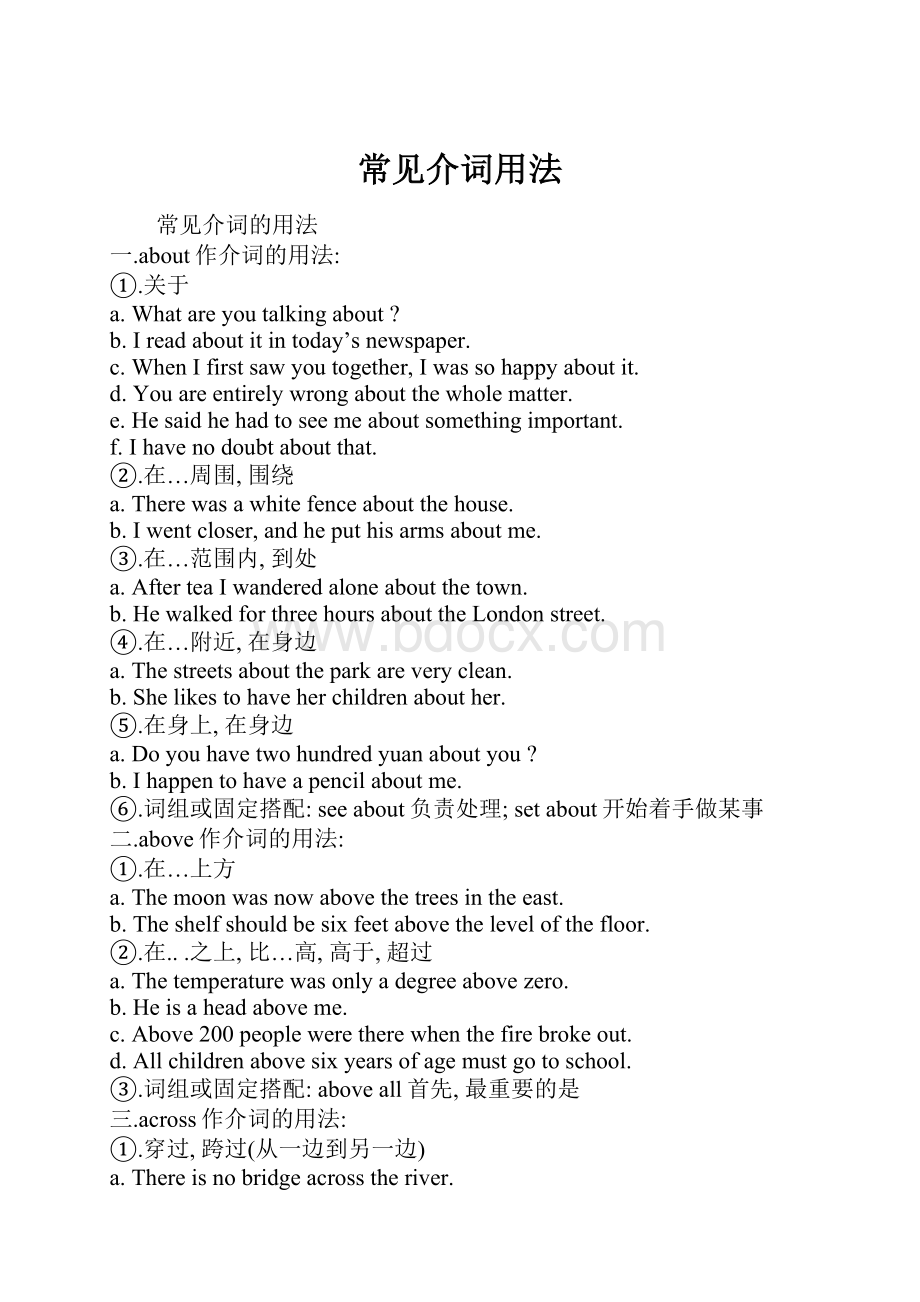常见介词用法.docx
《常见介词用法.docx》由会员分享,可在线阅读,更多相关《常见介词用法.docx(24页珍藏版)》请在冰豆网上搜索。

常见介词用法
常见介词的用法
一.about作介词的用法:
①.关于
a.Whatareyoutalkingabout?
b.Ireadaboutitintoday’snewspaper.
c.WhenIfirstsawyoutogether,Iwassohappyaboutit.
d.Youareentirelywrongaboutthewholematter.
e.Hesaidhehadtoseemeaboutsomethingimportant.
f.Ihavenodoubtaboutthat.
②.在…周围,围绕
a.Therewasawhitefenceaboutthehouse.
b.Iwentcloser,andheputhisarmsaboutme.
③.在…范围内,到处
a.AfterteaIwanderedaloneaboutthetown.
b.HewalkedforthreehoursabouttheLondonstreet.
④.在…附近,在身边
a.Thestreetsabouttheparkareveryclean.
b.Shelikestohaveherchildrenabouther.
⑤.在身上,在身边
a.Doyouhavetwohundredyuanaboutyou?
b.Ihappentohaveapencilaboutme.
⑥.词组或固定搭配:
seeabout负责处理;setabout开始着手做某事
二.above作介词的用法:
①.在…上方
a.Themoonwasnowabovethetreesintheeast.
b.Theshelfshouldbesixfeetabovethelevelofthefloor.
②.在...之上,比…高,高于,超过
a.Thetemperaturewasonlyadegreeabovezero.
b.Heisaheadaboveme.
c.Above200peopleweretherewhenthefirebrokeout.
d.Allchildrenabovesixyearsofagemustgotoschool.
③.词组或固定搭配:
aboveall首先,最重要的是
三.across作介词的用法:
①.穿过,跨过(从一边到另一边)
a.Thereisnobridgeacrosstheriver.
b.HehurriedacrossthebridgetoWaterloo.
②.在(河,街等的)另一边
a.Thebusstopisjustacrosstheroad.
b.Acrossthestreetwasacaféfullofpeople.
③.交叉
a.Hesatwithhisarmsacrossthechest.
b.Atonepointtherailwaylinegoesacrosstheroad.
④.在…全境,在…境内
a.Therearehundredsofsuchshopsacrossthecountry.
b.ThemeasuresarealreadytakeninafewplacesacrosstheUnitedStates.
⑤.词组或固定搭配:
comeacorss偶然碰到
四.after作介词的用法:
①.(指时间)在…之后
a.Whatshallwedoaftergraduation?
b.Hewasstillweakafterhislongillness.
c.AftersendingthatletterIrealizedhowstupidIwas.
d.Afterhavinghadtwelvemonths’practice,Idecidedtomakeonemoreeffort.
②.(指空间)在…后面
a.Heenteredtheroomafterhisfather.
b.Hecalledaftermethreeorfourtimes.
③.照…的样子,跟着
a.Willyoupleasemaketheboxafterthismodel?
b.Theboywasnamedafterhisuncle.
④.词组或固定搭配:
afterall毕竟,究竟;afterdark天黑之后;beafter想得到,寻求,追求;goafter追求,设法得到;lookafter照顾,照看;oneafteranother一个接一个地
五.against作介词的用法:
①.表示反对关系:
a.IwillspeakagainstanythingthatIknowtobewrong.
b.Manyofthestudentsareagainsttheplan.
②.(表位置)靠着,顶着,迎着,衬着
a.Thepianostoodagainstthewall.
b.Hecouldheartherainpatteringagainstthewindows.
c.Thetreeswereblackagainstthemorningsky.
d.Hestruckherheadagainstthebranchofatree.
③.预防,防备,准备…时用
a.Wearealltakingmedicineagainstthedisease.
b.Theyboughtsomewarmclothesagainstthecoldwinter.
c.Wehavetosavesomemoneyagainstoldage.
④.表示对比关系
a.Hewaselectedbyamajorityof20votesagainst10.
⑤.词组或固定搭配:
againstone’swill违反自己的意愿;goagainst违反,不利于
六.along作介词的用法:
表示“沿着”
a.Theytraveledalongthewestcoast.
b.Therearetreesallalongtheriverbanks.
七.among作介词的用法:
①.在…中间,在…当中,是…中间的一个
a.Thegreatleaderpreferstoliveamongtheworkingpeople.
b.Dividethemoneyamongthesixofyou.
c.Thetownliesamongthemountains.
d.Iwasamongthefirsttoarrive.
e.Shelleyisamongtheworld’sgreatestpoets.
f.Parisisamongthelargestcitiesintheworld.
②.(和反身代词等连用)相互间,共同,一起
a.Theyquarreledamongthemselvesforhalfanhour.
b.Thethreeboysdiscussedthematteramongthemselves.
c.Amongthem,theycollectedoverahundredpounds.
八.at作介词的用法:
①.在(某一地点或场合)
a.Jenkinswasnotathisoffice.
b.Hehadtakenajobatachildren’shospital.
c.Iliveat403,BrookStreet.
d.Thehadlefttheluggageatthestation.
e.Watsonaskedhimtodinneratarestaurant.
f.Let’smeetattheentranceofthestation.
g.Thecariswaitingatthegate.
h.Thegirlisatthewindow,lookingoutintothegarden.
i.Imetherattheendoftheroad.
j.Isatatthebackoftheroom,theimportantpeoplesatatthefrontoftheroom.
k.Thepostofficeisatthecornerofthestreet.
l.Didyouspeakatthemeeting?
m.Imethimataneveningparty.
②.在(某一个时刻,时候,时期等)
a.Dinnerwasatoneo’clock.
b.AtthepresentmomentheissupposedtobeinParis.
c.Atnoontherewasstillnonews.
d.Heworkedinthedaytime,andatnighthewenttothenightschool.
e.Attheendoftheyeartherewasagreatdealtodo.
f.Cyrilwasbornin1874atChristmas.
g.Atthattimehewasinhismiddlesixties.
h.Atthistimeofyearitdidn’tgetdarkuntilnineo’clock.
i.Therailwaywasbeingbuiltatthatperiod.
③.向,对(表示动作的方向或目标)
a.Iwishyou’dcomeandlookatmydrawing.
b.OldMr.Smithstaredathisyoungestson.
c.Heshotatthebearbutmissed.
d.Thenthreepolicemenrushedathim.
④.为,对于(表示引起某种情绪的原因)
a.Helookedsurprisedatseeingus.
b.Hewasveryangryatlosingthegame.
c.Sophiawasverydelightedatthechance.
d.Hefeltgladatwhattheteacherhadsaid.
e.Theywereoverjoyedathisreturntowork.
f.Thewholenationwasindeepsorrowathisdeath.
⑤.在…的情况下(表示一个动作的起因)
a.Hewaswritingthestoryattherequestofhisteacher.
b.Alltheatreswereclosedatthecommandofthegovernment.
⑥.表示在某状态下或在进行某动作
a.Thecountrywasatwarfor6yearsinthe1920s.
b.Theywereattheirmealwhenthephonerang.
c.Hewasathisworkuntillateintonight.
⑦.在某方面
a.Sheisquitecleveratdrawing.
b.Heisanexpertatrepairing.
⑧.表示价格,数量,速度等
a.Ihadasmallroom,atacostoffifteencentspernight.
b.Hesellstheclothatadollarameter.
c.Thecarisrunningatitstopspeed.
d.Theyareworkingattopspeedtodevelopanewprintingmachine.
⑨.词组或固定搭配:
atatime一次;not…atall一点也不;atallcosts不惜一切代价;atanyrate不管怎样;atfirstsight乍一看,一见面;atheart在内心里;atlast最后,终于;atleast至少;atmost至多;atonce马上,立刻;atpresent目前,现在;atthesametime同时;atthetopofone’svoice高声地;attimes有时候,间或;atwork在工作,起作用;atworst在最坏情况下
九.before作介词的用法:
①.在…前面
a.Hesatbeforethefiretowarmherself.
b.Iwillnothaveyoutalkingthatwaybeforethechildren.
②.在…以前
a.Itbegantorainjustbeforemidnight.
b.HehadcometoEuropebeforetheoutbreakofthewar.
c.Hewaitedalittlewhilebeforemakinguphismind.
d.Beforeentering,Holmesmadeanexaminationofthedoor.
③.词组或固定搭配:
beforelong不久,一会儿之后;before(one’s)time提前,早到
十.behind作介词的用法:
①.在…后面,到…后面
a.Thereisagardenbehindthehouse.
b.Thedogwasrunningbehinditsmaster’sbicycle.
c.Wecouldfeelthethreatbehindalltheysaid.
d.Hewasbehindtheothersinability.
②.比…晚
a.NewYorkistwelvehoursbehindPekingintime.
b.Hearrivedattheofficetenminutesbehindme.
③.词组和固定搭配:
behindthetimes过时,跟不上时代;behindtime晚了,晚点
十一.below作介词的用法:
表示“在…以下,在…下面”
a.Thetemperatureisbelowfreezing.
b.Minersworkbelowthesurfaceoftheearth.
十二.beside作介词的用法:
①.在…旁边
a.Hewassittingbesideher.
b.Thehouseisbesidetheriver.
②.和…比较起来
a.Hisworkseemspoorbesideyours.
b.Besidelastyear’sresults,thenumberforthisyearhavefallen.
十三.besides作介词的用法:
表示“除了”
a.Ithinkthereareninepoundsleft,besidescomepennies.
b.TwelvestudentspassedtheexambesidesJim.
十四.beyond作介词的用法:
①.在…之外,在…的那一边(更远处)
a.Thehouseisbeyondthebridge.
b.Thesunsetsbeyondthedistanthills.
②.超出(能力,范围等)
a.Thenoisychildisbeyondhercontrol.
b.Thestarsintheskyarebeyondnumber.
c.Todothiswasquitebeyondmyability.
d.Hewasbeyondthehelpofthedoctor.
e.Thisismuchtooexpensivebeyondmyincome.
f.Thecarwasdamagedbeyondthehopeofrepair.
g.Thatisgoingbeyondjoke.
③.超过
a.Ishallnotstaybeyondhalfanhour.
b.Thereweren’tbeyondtwentypeoplepresent.
④.到…以后,比…晚
a.Don’tstaytherebeyondmidnight.
b.Heneverseesbeyondthepresent.
十五.but作介词的用法:
①.表示“除去,除开”,多和nothing,notanything,nobody,nowhere,who,all等连用,可以接名词,代词,介词短语,形容词,不定式等
a.Ineversawhimreadinganythingbutnewspaper.
b.NobodyelsebutRobertcouldeversaysuchathing.
c.Everyonehasknowsitbutyou.
d.Putitanywherebutonthefloor.
e.YoucanfindthatsortofthingnowherebutinEngland.
f.Shelooksanythingbutwell.
g.Shewasanythingbutpleasedwhenheheardthis.
h.Wehadnochoicebuttowait.
i.Hewantednothingbuttostaytherewithher.
j.Ididnothingbut(to)writealetterthisevening.
②.词组和固定搭配:
butfor…要不是…(句子谓语多用虚拟语气)
a.Butfortherainweshouldhavehadapleasantjourney.
b.Butforhishelp,Iwouldnothavefinishedtheworkintime.
c.Butforthestorm,weshouldhavearrivedearlier.
十六.by作介词的用法:
①.在…旁边,从…旁边(经过)
a.Isatdownjustbythecorner.
b.Iputthevasebackonthetablebythewindow.
c.Hewalkedbytheotherswithoutlookingatthem.
②.通过,经由,取道
a.Herosequicklyandwentoutbyanotherdoor.
b.IshallreturnpossiblybyDublin.
③.在(某时)前,到…时为止
a.BylastFridaywehadstayedhereformorethantendays.
b.Bythattimeshe’dhavethoughtoutaplan.
c.BynextFridayIwillhavefinishedthework.
d.Bythenhewasmorethanfiftyyearsofage.
e.Iwillbebackbythree.
④.表示动作的执行者
a.Areallthesegoodmadebymachine?
b.Hewaspunishedbytheteacherforbeinglate.
c.HaveyoureadthatnovelbyShirley?
⑤.表示手段或方式,可译为“通过…,用…,以…,按照…”
a.Judgedbywhatheiswearing,heisveryrich.
b.Judgingbythesmell,thefoodmustbeverygood.
c.Itisnineo’clockbymywatch.
d.Byhelpingthemwearehelpingtosaveourselves.
e.Hetaughthimselftoplaytheviolinbypractisingallnight
f.ShallIsenditbypost?
⑥.表示工具
a.Icameherebybus.
b.Ireturnedtotownbytrain.
c.Shecalledhimupbytelephonetothankhim.
d.Thiskindofshoesaremadebyhand.
⑦.和seize,take,hold等动词连用,说明接触身体的哪一部分
a.Sheseizedthechildbythecoll